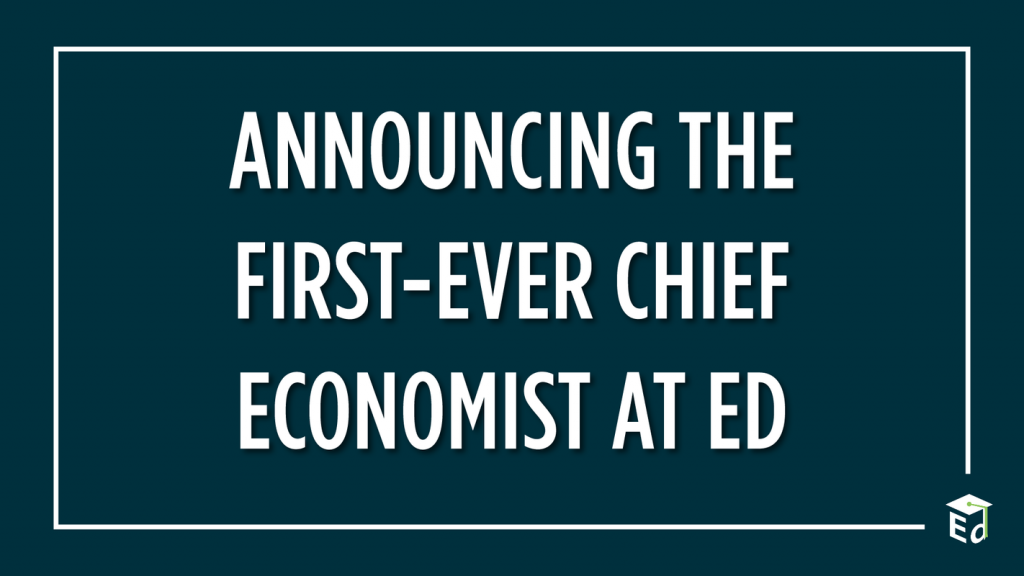
By: James Kvaal
To achieve President Biden’s ambitious goals for education, we need to start with the evidence on what works for students and be guided by data as we seek to understand and fix our problems.
That’s why I’m pleased to share some big news: Secretary Cardona has appointed Jordan Matsudaira to serve as the Department of Education’s first-ever Chief Economist. Jordan will also continue to serve as Deputy Under Secretary.
Across the Department, staff are already using sophisticated data analyses and experimentation to inform policy and improve operations. As Chief Economist, Jordan will work with experts in the Office of the Chief Data Officer, the Institute for Education Sciences, Budget Service, and Federal Student Aid to:
- Provide the best-possible analysis and advice to guide real-time policymaking;
- Conduct rigorous research to further key elements of the Department’s learning agenda;
- Build a culture of experimentation, including partnerships with leading social science researchers to pilot-test new ways to serve students and borrowers; and
- Serve as a liaison to the research community so that leading researchers’ insights and evidence inform our agenda and we can work together to build the evidence and research base on how best to strengthen education.
Jordan is the perfect person to define and carry out the role of Chief Economist. An economist from Teachers College at Columbia University, his research has focused on the nexus between education and the labor market and how government policy can promote socioeconomic mobility. He has worked with higher education systems and state governments to develop data infrastructure and research partnerships to support data-driven decision making—a focus of this Administration. And he’s experienced in bringing rigorous data analysis and evidence to crafting policy at the highest levels of government. As Chief Economist of President Obama’s Council of Economic Advisers, he contributed to the development of policies to promote higher education access and accountability, and led the interagency team developing data for Department’s College Scorecard initiative.
I’m especially pleased that Jordan has already started assembling a team of stellar researchers to help him in this work. New members of the team include Lesley Turner, Associate Professor of Economics from Vanderbilt University, and one of the nation’s foremost experts on higher education finance and the economics of student financial aid policy; Tomás Monarrez, a labor economist and Senior Research Associate from the Urban Institute’s Center on Education Data and Policy, who has studied the drivers of racial segregation in schools and the effects of state higher education expenditures on student outcomes; and Dennis Kramer, Director of the Policy Research and Analysis Group at the Office of Federal Student Aid, who brings experience from that role and a stint at the Office of Evaluation Sciences conducting randomized experiments to evaluate behavioral science informed interventions at FSA aimed at improving student outcomes. This team is continuing to explore opportunities to expand collaboration with leading academics and provide opportunities for graduate students to support strategic projects related to the Department’s policy goals.
While we are currently building this function out of the Office of the Under Secretary, with a focus on higher education, over time we hope to expand the scope of the Office of the Chief Economist. As that develops, the permanent home for the office may shift within the Department.
Secretary Cardona and I believe that our country needs a more inclusive system that helps many more students graduate and reach their goals. Leading colleges and universities are already finding proven solutions and using data to identify areas in need of improvement and evidence-based strategies to address them, evaluate the success of their efforts, and measure their progress. As Chief Economist, Jordan will help the Department of Education lead by example, and I hope the broader research community will find him a helpful ally in helping the Department and the field to better integrate cutting-edge research and evidence into practice and policy.